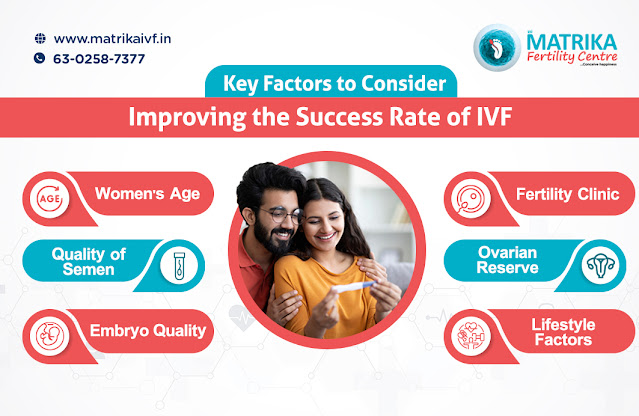Strategic Planning for IVF Success: Key Factors for Higher Success Rates
Planning for Success: Key Factors for Increasing IVF Success Rates
Embarking on the journey of parenthood is a profound and personal adventure, but for many, the path may be paved with unexpected challenges. In such instances, In Vitro Fertilization (IVF) emerges as a beacon of hope, offering a unique and advanced solution to those facing fertility hurdles.
IVF, or In Vitro Fertilization, is a medical procedure where an egg and sperm are combined outside the body to create an embryo, which is then implanted in the uterus. This assisted reproductive technology has revolutionized the landscape of fertility treatments, providing new possibilities for individuals and couples striving to realize their dreams of becoming parents.
However, the road to a IVF success rate is multifaceted and requires meticulous planning. From understanding the various stages of the IVF process to making informed decisions about lifestyle and health choices, strategic planning plays a pivotal role. In this blog, we will explore the nuts and bolts of IVF and underscore the importance of comprehensive planning to enhance the likelihood of a successful outcome.
Understanding the IVF Process
Understanding the intricate steps of the in vitro fertilization success rate crucial in navigating this path towards parenthood.
A. Step-by-step explanation of the IVF process:
Ovulation Induction: Stimulating the ovaries to produce multiple eggs.
Egg Retrieval: Extracting mature eggs from the ovaries for fertilization.
Fertilization: Combining eggs and sperm in a controlled environment.
Embryo Culture: Monitoring the development of fertilized eggs into embryos.
Embryo Transfer: Placing a selected embryo into the uterus for potential implantation.
Luteal Phase Support: Supporting the uterine lining for successful embryo implantation.
B. Role of fertility clinics and specialists:
Choosing the Right Fertility Clinic: Evaluating clinics based on success rates, facilities, and patient reviews.
Selecting a Skilled Fertility Specialist: Ensuring the expertise of the medical professional overseeing the IVF process.
Importance of Open Communication: Establishing transparent and open dialogue with the medical team, fostering trust and understanding.
Key Factors for Increasing IVF Success Rates
Age and IVF Success Rates:
One of the primary determinants of IVF success is the age of the woman undergoing the procedure. Age significantly affects the quality and quantity of a woman's eggs, directly impacting the success of fertilization and embryo development. Generally, younger women tend to have higher IVF success rates compared to older women.
Women under 35 typically experience higher success rates, with a greater likelihood of a successful pregnancy and live birth. As age increases, the success rates gradually decline. It's essential for couples to be aware of these age-related variations and set realistic expectations based on individual circumstances.
Egg Freezing and its Impact on Success Rates:
Egg freezing has emerged as a revolutionary option for women who wish to preserve their fertility for future family planning. This technique involves harvesting and freezing a woman's eggs when they are at their peak quality, usually in her twenties or early thirties. These frozen eggs can be thawed and fertilized through IVF when the woman is ready to conceive.
The success of IVF using frozen eggs is influenced by the age at which the eggs were frozen. Success rates are generally higher when eggs are frozen at a younger age. This highlights the importance of proactive family planning and considering options like egg freezing to optimize IVF success rates.
Quality of the Embryos:
The quality of embryos plays a pivotal role in the success of IVF. During the IVF process, eggs are fertilized with sperm, resulting in embryos. The embryos are then graded based on their quality, with factors such as cell division, symmetry, and chromosomal abnormalities taken into account.
High-quality embryos have a better chance of implanting in the uterus and developing into a healthy pregnancy. IVF success rates are significantly influenced by the number of high-quality embryos available for transfer. Advances in embryo assessment techniques, such as preimplantation genetic testing (PGT), can further enhance the selection of viable embryos, contributing to increased success rates.
Reproductive Health and Lifestyle Factors:
Beyond age, several reproductive health and lifestyle factors can impact IVF success rates. Conditions such as polycystic ovary syndrome (PCOS), endometriosis, and uterine abnormalities can affect fertility and the success of IVF. It is crucial for couples to address any underlying reproductive health issues before undergoing IVF to optimize their chances of success.
Additionally, lifestyle factors such as smoking, excessive alcohol consumption, and obesity can negatively impact fertility. Adopting a healthy lifestyle, including a balanced diet and regular exercise, can positively influence IVF success rates. It's essential for couples to work closely with their healthcare providers to identify and address any factors that may hinder the success of IVF.
Optimal Timing of IVF Treatment:
The timing of IVF treatment is a critical factor that can influence success rates. Women should undergo IVF at a time when their reproductive health is optimal. This includes addressing any underlying health issues, optimizing ovarian function, and ensuring the uterus is receptive for embryo implantation.
Furthermore, couples should consider the emotional and psychological aspects of undergoing IVF. Stress and anxiety can impact fertility and the success of IVF. Taking the time to prepare mentally and emotionally for the IVF journey can contribute to a more positive outcome.
Choosing the Right IVF Clinic:
The choice of an IVF clinic can significantly impact the success rates of fertility treatments. Not all clinics are created equal, and success rates can vary widely. When selecting an IVF clinic, couples should carefully research and consider factors such as the clinic's reputation, the experience of the medical team, success rates, and the range of services offered.
Reviewing the clinic's success rates, especially in relation to the age group of the woman undergoing IVF, provides valuable insights into the clinic's expertise and track record. Reading patient reviews and testimonials can also offer a firsthand perspective on the clinic's approach and patient experience.
Individualized Treatment Plans:
No two individuals or couples are alike, and fertility challenges can vary widely. Therefore, it's crucial for couples to receive personalized and individualized treatment plans tailored to their specific needs and circumstances. IVF success rates can be optimized when treatment plans are customized based on factors such as age, reproductive health, and previous fertility history.
Open communication with healthcare providers is essential to ensure that the chosen treatment plan aligns with the unique requirements of the couple. This individualized approach can enhance the likelihood of a successful IVF outcome.
Incorporating Acupuncture and Other Complementary Therapies:
Complementary therapies, such as acupuncture, have gained popularity as adjunctive treatments to enhance IVF success rates. While scientific evidence on the effectiveness of these therapies is still evolving, some studies suggest that acupuncture may improve blood flow to the uterus and ovaries, creating a more favorable environment for embryo implantation.
Couples considering complementary therapies should consult with their healthcare providers to ensure that these interventions are safe and align with their overall treatment plan. Integrating complementary therapies into the IVF journey should be done in collaboration with the medical team to maximize the potential benefits.
Emotional Support and Coping Strategies:
The emotional toll of infertility and the IVF process should not be underestimated. Couples often face stress, anxiety, and emotional ups and downs throughout the fertility journey. Emotional well-being is interconnected with physical health, and addressing the psychological aspects of IVF is crucial for overall success.
Seeking emotional support through counseling, support groups, or connecting with others who have undergone similar experiences can provide valuable coping strategies. Couples should prioritize their mental health, practicing stress-reducing techniques and maintaining open communication with their partners and healthcare providers.
Conclusion
Planning for success in the IVF journey involves a comprehensive approach that considers various factors influencing success rates. From understanding the impact of age and egg freezing to addressing reproductive health issues, choosing the right clinic, and incorporating complementary therapies, each element contributes to the overall success of IVF.
As couples navigate the complexities of infertility, staying informed, proactive, and emotionally resilient is key. By prioritizing individualized care, making informed choices, and seeking support, couples can enhance their chances of a successful IVF outcome. While the journey may be challenging, the ultimate goal of building a family is within reach for many with the advancements in fertility treatments and a holistic approach to reproductive health.




Comments
Post a Comment